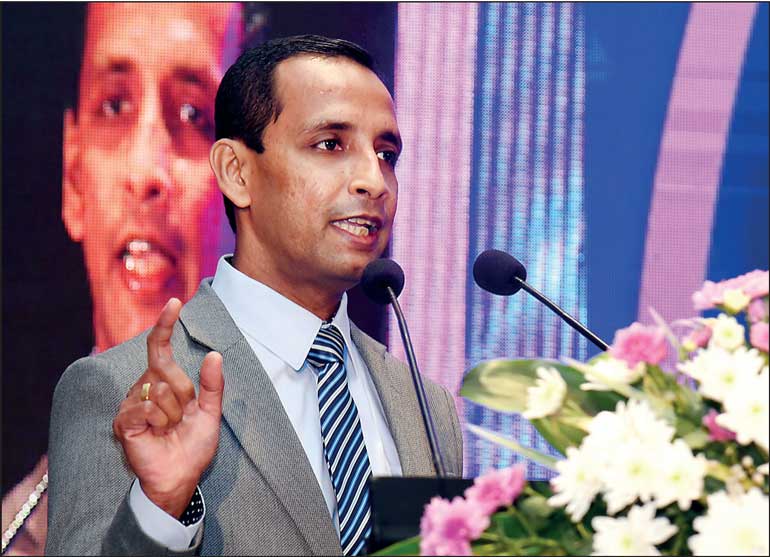Friday Feb 20, 2026
Friday Feb 20, 2026
Friday, 21 January 2022 00:00 - - {{hitsCtrl.values.hits}}

IFC Sri Lanka and Maldives Acting Country Manager Victor Antonypillai - Pic by Ruwan Walpola
By Sandesh Jayasinghe
The International Finance Corporation (IFC) Acting Country Manager Victor Anthonypillai this week declared, post-pandemic, the banking sector faces far reaching challenges and it will have to move ‘ahead with agility’, as the rule and not as the exception.
He made this observation in his keynote at the 32nd Anniversary Convention of the Association of Professional Bankers (APB) on Tuesday.
Pointing out that problematic practices that may hinder the growth of the economy, he said the most concerning of those practices were the ‘racking up of unsustainable debt’. Currently of the $ 300 trillion of global debt, $ 180 trillion belonged to banking sector.
By establishing the volatile economic situation, he made a push for all stakeholders, regulators and banking institutions and professionals to act responsibly. This included questioning a hall full of top banking professionals about the ethics of their practices, which directly affects the economy.
Anthonypillai suggested that executives should take necessary actions to transition from a supply driven culture to demand-driven culture, which he argued would have less fluctuation and would be easier to manage.
He also outlined matters of concern given the future practices of the banks. The first was the rapid development of technology.
“The current advent of technology is ‘disrupting the traditional banking sector’ and ‘challenges bank business models’,” he said.
In addition, he alerted banks to the technological trends to watch out for which were Artificial Intelligence (AI), machine learning, adopting APIs, blockchain technology, innovative regulations, mergers and acquisition of disruptors and financial institutions.
The risks in the implementation of these technologies were engaged in, with an emphasis on the importance of data privacy and cyber security.
Anthonypillai also brought up the devastating economic realities of climate change, where 91% of Contract Research Organisations (CROs) identified climate change as the ‘biggest risk to manage in the future’ in a recently concluded IFC survey.
“This number was a steep increase of 52% in the same survey completed two years prior, which highlighted the immediate threat of the climate on the economy, ‹› he said.
The inevitable and continuous struggles in the time to come were firmly maintained as he stated: “The battle with the climate was never a choice and never will be.”
As a solution, he suggested sustainability practices with an urge for the Government, financial institutions, regulators, the private sector, innovation and technology to work in tandem to establish sustainability.
“The benefits of sustainability includes the opportunity for businesses to earn up to $ 23 billion in business, an addition of 213 million cumulative jobs to the economy and a reduction of 413 tons of carbon dioxide in developing countries like Sri Lanka,” he pointed out.
